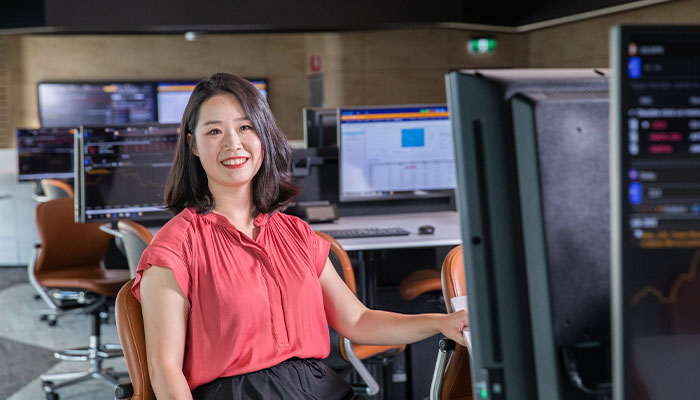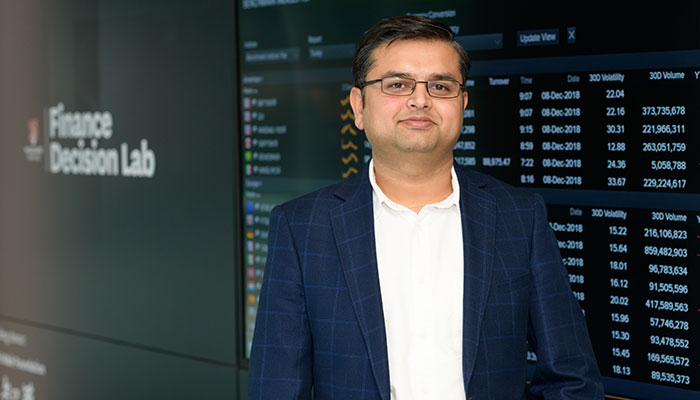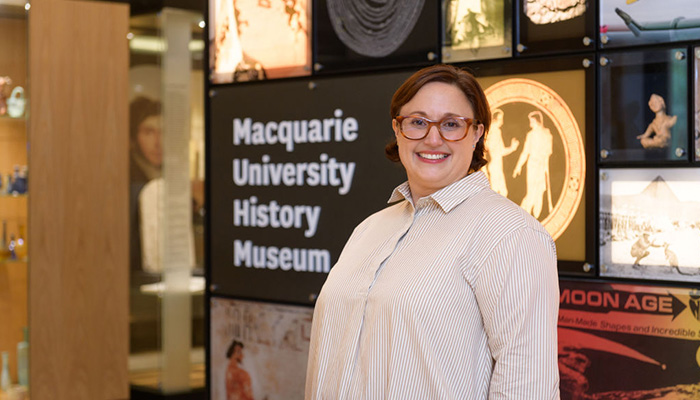The world of financial markets is exciting and fast-paced but often confusing for an outsider to understand.

To market: Inside the Finance Decision Lab, where each terminal provides access to real-time financial analytics.
At Macquarie Business School, any enrolled student or researcher can discover what really happens in these markets and how they operate. They’ll learn how to buy and sell stocks, bonds and futures or use real-world financial analytics tools in a simulated environment – without any real money.
At the University’s Finance Decision Lab, two of the world’s leading sources of financial data and business intelligence, FactSet and Refinitiv (formerly Thomson Reuters), have partnered to create a custom-designed space.
The FInance Decision Lab has 12 terminals (two each on six tables) where groups of students can gather around and collaborate. Each terminal provides access to real time financial analytics, including stock prices and analysis, industry reports, current information on financial markets, financial institutions and other corporations.
The important thing with these competitions is that it also bolsters the students softs skills.
“The lab is a multipurpose facility,” says Associate Professor Abhay Singh, deputy head of the Department of Applied Finance. “It also has a boardroom-style collaboration area so we can have students on the terminals and then move to the boardroom and use interactive screens to continue the discussions with the whole class.”
Students in the Bachelor of Applied Finance, Masters of Banking and Finance, Marketing, Business Analytics and Actuarial studies all use the space in this way.
Put to the stock market challenge
The lab prepares students for the real world. If they want to move into a career in investment banking, financial analysis or trading, they would use the same FactSet and Refinitiv screens. “Same tools, the only difference is they’d be using their client’s real money,” Singh adds.

All in: Associate Professor Abhay Singh says the door is open to everyone when it comes to the Lab's stock trading challenges.
As well as teaching and researching, the space is open for groups of visiting high school students to have a go and for competitions.
Every year, Macquarie holds stock trading challenges when participants each have a simulated $100,000 to trade. Last year the focus was on ESG (environment, social and governance) or companies that have a positive environmental or social impact. Students had to pick stocks and track how they fared over two weeks and justify their decisions to the judges.
And it’s not just for finance students. Singh says that the door is open to everyone and encourages students from other faculties to participate too.
It’s also lots of fun and the sponsors donate cash prizes for the winners.
In 2019, the Lab hosted a real estate forecasting challenge that had more than 90 student participants. In groups of up to five, each group had to forecast the movement of the Australian real estate market over a specific period.
“The important thing with these competitions is that it also bolsters the students' softs skills,” says Singh. “They all have to write reports, argue their case and then present them to judges, who are often from industry. So it again prepares them for what will happen in the real world. It’s also lots of fun and the sponsors donate cash prizes for the winners.”
These competitions also engage students with industry and in many cases, lead to student internships.
The terminals are also used by staff academics and researchers. “It's an environment that provides data and analytics for academic research as well, research to be published in peer-reviewed journals,” Singh adds.
To find out more about courses linked to this space see the Bachelor of Applied Finance, Masters of Banking and Finance, Marketing, Business Analytics and Actuarial studies.



